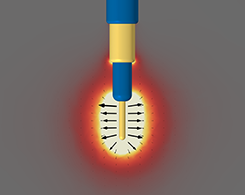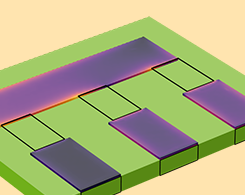Blog Posts Tagged AC/DC Module

Modeling a Pencil Beam Scanning Nozzle Used for Proton Therapy
In proton therapy, an energetic beam of protons is used to deliver ionizing radiation to the treatment area. Learn how particle tracing simulation can be used to help advance this treatment.

Modeling Electrical Contact Resistance at Bolted Joints
As of COMSOL® version 6.3, there is a new boundary condition that simplifies the workflow when setting up a structural mechanics problem. Explore this feature in action here.

Treating Time as a Space Dimension
In this blog post, explore a particularly important approach to solving the time-periodic steady state of a system that can be described by a set of algebraic equations.

Using Differential Inductance and Coils in COMSOL Multiphysics®
Differential inductances are useful for building simplified lumped models. Explore 4 examples of how to extract differential inductance in COMSOL Multiphysics® here.

Modeling Electric and Magnetic Fields from Power Lines
Modeling and simulation can be used to analyze fields generated by power lines, which can lead to a further understanding of how these fields interact with the surrounding environment.

Modeling Dispersion in an Electric Currents Model
As of COMSOL Multiphysics® version 6.2, new electrical dispersion modeling capabilities are available. This functionality is especially important for modeling insulators and living tissues.

Using Different Physics Interfaces for RF Electromagnetic Heating Models
RF heating problems can be modeled with both the RF Module and the AC/DC Module. Learn more about their capabilities here.

Combining Volumetric Conductor Models and Lumped Elements
With the AC/DC Module, it is possible to connect a full-fidelity volumetric conductor model to a lumped circuit element model. Learn how here.
